Raspberries are small fruits that come in different colors, including black, purple, golden, and red.
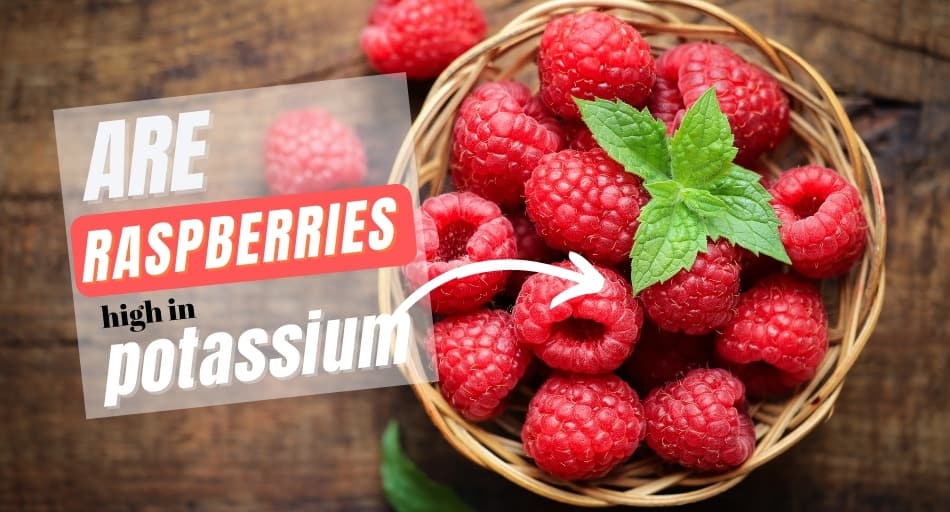
Most commonly harvested in summer, they’re sweet but also nutritious, loaded with several vitamins and minerals, including potassium.
If you follow a low-potassium diet, it might be hard to find fruits that don’t contain large amounts of this mineral.
So, are raspberries suitable for a kidney-friendly diet? Are raspberries high in potassium?
Table of Contents
Are raspberries high in potassium?
Raspberries contain a moderate amount of potassium, which qualifies them as a low-potassium fruit. As a result, they can be a safe addition to a low-potassium, kidney-friendly diet.
They’re also loaded with important nutrients that contribute to food health and help you fight off various diseases. So, there’s no reason why you shouldn’t include some of these delicious berries in your diet.
Can You Check Your Potassium Level at Home?
How much potassium is in raspberries?
One cup of fresh raspberries provides you with around 186 mg of potassium. As you can see, a single serving of raspberries contains less than 200 mg of potassium, so they’re safe for a low-potassium diet.
As a result, people with kidney disease and those prone to kidney stones can include this sweet fruit in their diets without worries.
Raspberries are also a good food choice for people with potassium sensitivity, as they don’t pack a lot of this mineral into one serving.
Wild raspberries are slightly higher in potassium than their farmed counterparts. But this difference isn’t huge, and most raspberries available in the stores are farmed.
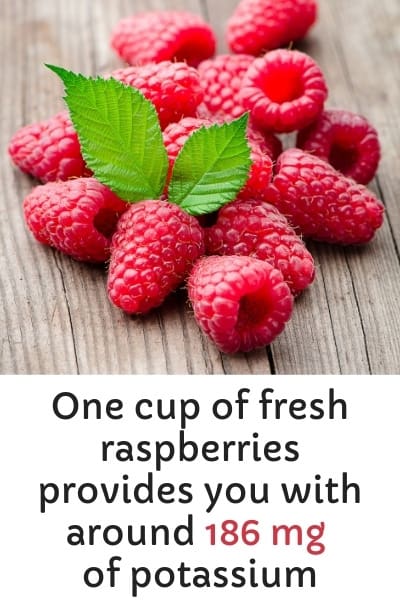
So, when you purchase your raspberries, you’re most likely getting the farmed variety, which is slightly lower in potassium.
Are raspberries healthy?
Almost all calories found in raspberries come from carbohydrates, including sugar and fiber.
A one-cup serving of raspberries provides you with 8 g of fiber, making this fruit a great source of this nutrient.
This means that eating raspberries can help control your blood sugar levels and lower your risk of type 2 diabetes.
The same fiber may also improve insulin resistance, especially in people with diabetes.
Raspberries also contain powerful plant compounds and antioxidants that may protect you from cancer. Extracts from raspberries block the growth of cancerous cells, which is a very impressive benefit.
These antioxidants also help flush free radicals out of your body, preventing oxidative stress and damage to your cells and tissues.
This lowers your risk of various chronic conditions, including heart disease and diabetes.
Raspberries provide you with a lot of anti-inflammatory properties, which prevent chronic inflammation and may aid in treating the symptoms of arthritis.
What’s more, concentrated raspberry extracts may reduce swelling in your joints and prevent joint pain almost as well as medication for arthritis.

So, as you can see, eating raspberries is a great way to stay healthy and prevent many chronic health conditions.
Some studies also show that due to the presence of special plant compounds and antioxidants, raspberries may help combat accelerated aging and skin damage.
Research suggests that regularly eating raspberries can improve your motor functions, balance, and strength.
The high vitamin C content of raspberries also helps protect your skin from damage caused by UV light and age.
This is also why many skincare products contain extracts made with this micronutrient and sometimes even raspberries.
Can you take in too much potassium from raspberries?
Raspberries don’t contain nearly enough potassium to allow you to overdose on this mineral.
Even people who have to follow a low-potassium diet can safely eat raspberries but in moderation.
To take in too much potassium from raspberries, you’d have to eat them for every single meal.
As it’s safe to say no one does that, you don’t have to worry about the potassium content of raspberries.
It’s also important to remember that potassium is still a crucial mineral for your health.
So, while you may need to adjust your diet to consume fewer high-potassium foods, you should still include some foods containing this mineral to stay healthy.
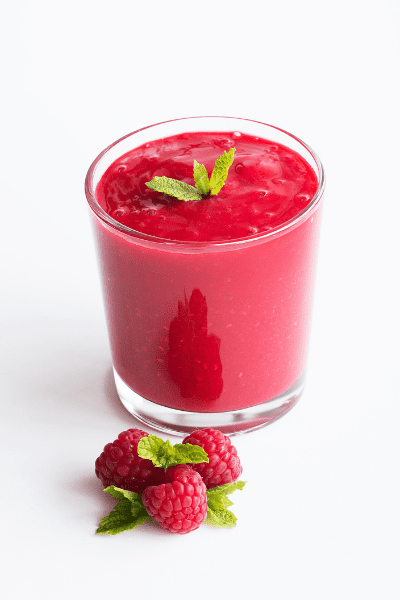
Potassium is vital for the health of your heart, and it also helps offset the negative effects of dietary sodium, lowering your blood pressure.
So, make sure not to stop eating potassium-containing foods altogether.
Is raspberry juice high in potassium?
One glass of raspberry juice contains 320 mg of potassium. Raspberry juice is the only product made with raspberries that you should avoid on a low potassium diet.
It’s not only high in potassium, but it also contains a lot of sugar. A diet high in sugar increases your risk of type 2 diabetes and other issues.
One way to avoid that would be to dilute your raspberry juice with some water.
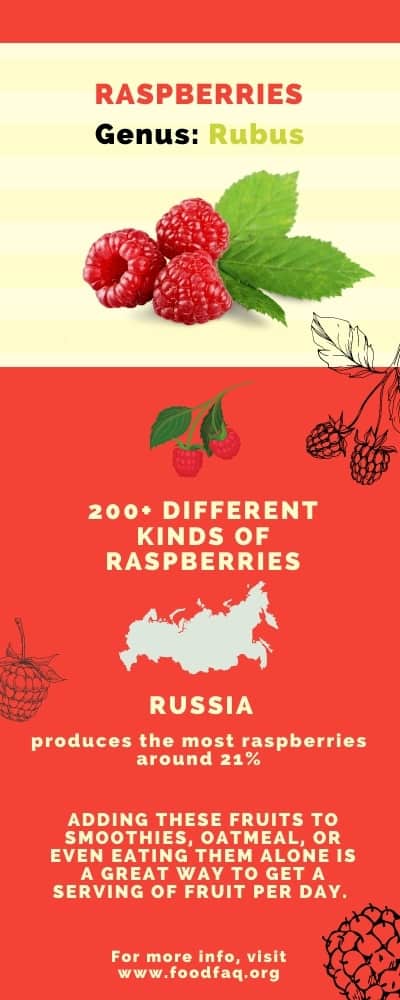
But you should still drink raspberry juice in moderation, regardless of what diet you follow.
Are canned raspberries high in potassium?
Half a cup of canned raspberries contains 121 mg of potassium. While canned raspberries are suitable for a low-potassium diet, most of the calories found in them come from sugar.
They’re also rather deficient in the important nutrients that fresh raspberries provide you with.
As a result, you might be better off eating raw raspberries as opposed to canned ones, which are usually packed with heavy syrup.
Is raspberry jam high in potassium?
Three tablespoons of raspberry jam contain 45 mg of potassium. This makes raspberry jam a great addition to a low-potassium diet, unlike some other jams and marmalades.
But even though raspberry jam is low in potassium, it’s still very high in sugar but low in fiber. So, consuming a lot of raspberry jam may lead to an increased risk of type 2 diabetes and high blood sugar levels.
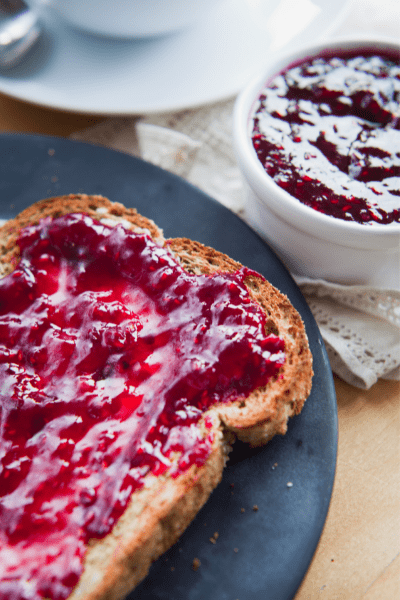
Because of that, make sure to stick to the recommended serving and follow an otherwise healthy, balanced diet.
Conclusion
Raspberries are relatively low in potassium, so you can safely add them to a diet focused on kidney health.
They’re also rich in several important nutrients, vitamins, and minerals that contribute to good health and may even improve the overall health of your kidneys and digestive system.
All in all, raspberries make for a great addition to any diet.
Don't know which foods are high in potassium? Read our article, 15 Best Food Sources of Potassium. We also have a guide to this important mineral: Potassium 101: All You Need To Know About Potassium.
